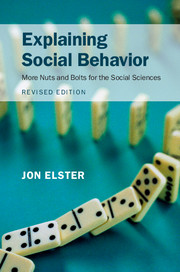IV - Interaction
Published online by Cambridge University Press: 05 August 2015
Summary
Social interaction can take many forms. (1) The outcome, for each agent, depends on the outcomes for others. This interdependence of outcomes can arise if the material or psychic welfare of others affects my own psychic welfare (Chapter 5). (2) The outcome of each can depend on the actions of all. This interdependence reflects general social causality (Chapter 17), illustrated in such phenomena as (human-made) global warming. (3) The action of each depends on the (anticipated) actions of all. This interdependence is the specific topic of game theory (Chapters 18 and 19), which also integrates (1) and (2) within its framework. (4) The beliefs of each depend on the actions of all. This interdependence can arise by a variety of mechanisms, such as “pluralistic ignorance” or “informational cascades” (Chapter 22). (5) The preferences of each depend on the actions of all. This interdependence is perhaps the least well-understood aspect of social interaction. Although I touch on some aspects of the question at various places, notably in Chapter 21, I offer no comprehensive account.
These interdependencies can arise through decentralized action by individuals who stand in no organized relation to each other (Chapter 23). Much of social life has more structure, however. Many outcomes occur through procedures of collective decision making – arguing, voting, and bargaining – through which groups of individuals reach decisions that are binding on them all (Chapter 24). Finally, institutions and constitutions create rules to put the incentives of individuals and goals of organizations in line with each other as well as constraints that have the dual effect of limiting and enabling the social agents (Chapter 25).
- Type
- Chapter
- Information
- Explaining Social BehaviorMore Nuts and Bolts for the Social Sciences, pp. 295 - 296Publisher: Cambridge University PressPrint publication year: 2015



